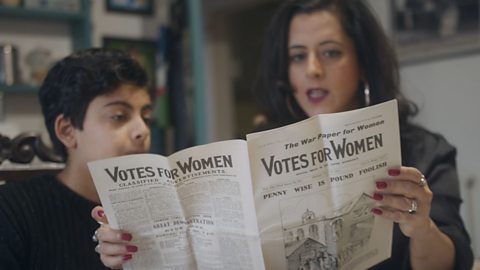Bea:
My name is Bea. I'm 15 years old and my family comes from the Philippines. I live in Rhyl in North Wales and I've come to see my friend Marigin, who is also from the Philippines. Marigin owns a Filipino bakery that I work at on weekends. She's going to tell me about why she moved to Wales 20 years ago to work as a nurse. Ever since the National Health Service was created in 1948, nurses have travelled to the UK from countries all over the world. More recently, nurses that work for the NHS have come from the Philippines,which is nearly 7000 miles away in Southeast Asia.
So why did you first come to Wales?
Marigin:
Well, life in the Philippines as a nurse, it's nice because nursing is service, this is what we are for. But, the salary is, havingfour children, is not enough. When I was living in the Philippines, I have seen an advert about this recruitment from the UK. I had to travel to Manila to have this exam and I could remember the queue was massive and I had to come at 6 o'clock to go in this queue. I was accepted luckily, among those 100 applicants. At the same time, looking back, because I have four children, it really was a mixed emotionbecause my youngest one is only 1 year old and I was thinking, 'I'm going to leave her behind.' But, thinking of the opportunitythat I would have when I came here, it did way more really.
After a few months, I was able to apply for a visa to come and join me here.
Bea:
Why did you come to Rhyl specifically?
Marigin:
Well, amongst the places that they have offered us, I chose Rhyl because I've seen the map and it's a beautiful placewith both the mountains and the sea. It's just perfect for us because I came from a countryside as well.
Bea:
Why did nurses from around the world come to the UK?
Marigin:
After World War 2, there were loads of sick people in the UK, and that's why they have invited the nurses from the country that they have ruled in the past, like Ghana, Jamaica and South Africa. Because of 2003 agreement from the government from the Philippines and UK, more Filipino nurses come over here and I think as today we have over 40,000 Filipino nurses here.
Bea:
What was it like to move to Wales at first?
Marigin:
It's quite difficult really being in the country that you are not used to, the weather especially. That's the only thing,that's the downside, but everybody is welcome us.
Bea:
And how did you end up becoming a baker?
Marigin:
When I was a child, I liked baking. On my day off, I do bake cakes and breads. I gave it as a gift for every time there's a party, Filipino party. Because of the demand that, 'Oh, Marigin, can you bake us this?' 'Can you bake us that?'. So I became a baker here. It's a good opportunity because at the same time, I can work and I can be a baker. In 2020, I have resigned as being a nurse because the demandfor bread and cakes for Filipinos has increased. So I want to concentrate on baking, but at the same time, I feel a bit sad really,because I have to quit nursing, which I've been doing for 12 years in the Philippines and 18 years here, so 30 years.Filipino loves cakes.
Every time there's a celebration, we celebrate it with cakes. When I bake cakes, they feel closer to home. The kind of cakes that we do, they could not buy it from here. You feel good, you feel better. It's quite wonderful.
Bea:
I really enjoyed talking to Marigin. I found her story very inspiring because she's helped lots of people throughout her life. And now she's also helping her small Filipino community in Rhyl, enjoy a taste of home.
Video summary
Marigin Opiala talks to 15 -year-old Bea about why she migrated to the UK, along with thousands of other Filipino nurses, to work for the NHS.
Ever since the National Health Service was created in 1948, nurses have travelled to the UK from countries all over the world. More recently, nurses that work for the NHS have come from the Philippines, which is nearly 7000 miles away in Southeast Asia.
Marigin talks about how she moved to Rhyl in North Wales to work as a nurse, which meant leaving behind her four children. This was difficult, but eventually they were able to join her.
She talks about her passion for baking traditional cakes and breads from the Philipinnes, and how, in 2020, she decided to quit nursing and open her own bakery, providing the local Filipino community with a taste of home.
This short film is from the BBC Teach series British Asian History.
Teacher Notes
Learning point
- To learn about the reasons why people have emigrated to Britain from Asia over time.
Key Vocabulary
This film gives you the chance to explore and learn this vocabulary in the context of a personal story.
Vocabulary used in the film:
- National Health Service
- Salary
- Visa (to come to live in a country)
- Baker
Vocabulary useful for discussing the film:
- Immigration and immigrants - coming to live permanently in another country.
- Emigration - leaving one's own country in order to settle permanently in another.
- Asia/Asian - the largest and most populous continent on earth.
- Britain/ British - "Great Britain" is often used to refer to England, Scotland and Wales, including their component adjoining islands.Great Britain and Northern Ireland now constitute the United Kingdom.
- Community - a group of people living in the same place or having a particular characteristic in common.
- Culture - a pattern of behaviour shared by a society, or group of people.
- Discrimination - the unjust or prejudicial treatment of different categories of people.
- Diversity - differences in racial and ethnic, socioeconomic, geographic and academic backgrounds.
- Equality - when people are treated the same, regardless of what they look like or where they come from.
- Inclusion - being a part of what everyone else is, being welcomed and embraced as a member who belongs.
- Legacy - something we inherit from past generations and pass to our future generations.
- Prejudice - a preconceived opinion that is not based on reason or actual experience.
- Racism - the belief that people of different races or ethnic groups have different value in society, and using this against them.
Before watching the film
You may want to discuss what your pupils understand by the word ‘immigrant’ and what they already know about people who have come to live in the UK, over time.
Pupils could also discuss whether they have certain types of food which is particularly special to them or their family. Why people buy and eat cakes. Do they ever eat cakes at special times of the year?
Please note, in the film Marigin talks about her mixed emotions when leaving the Philippines to become a nurse in Wales, because she had to leave her four children behind until she could apply for a visa and they could join her. As part of your preparation you should consider the needs of any pupils in your class who may have similar lived experiences.
Questions to consider
Depending on the focus of your lesson, you may wish to pause the short film at certain points to check for understanding, asking questions such as:
- What do you think were the challenges that Marigin faced? Why did she decide to move to Wales? How might she have felt at first?
- How do you think Marigin felt about living in Wales compared with the Philippines? She said it was ‘hard’. Why do you think she said this?
- Why did Marigin become a baker? Why are cakes special to her and her community?
- Why do you think Marigin was sad to stop working as a nurse after 30 years?
Activities to further explore learning
- Pupils could share and write recipes to make food which is special to them.
- Pupils could discuss how Marigin’s story has added to their understanding of Asian people who have come to live in the UK over time. After watching more of the films they could discuss similarities and differences in experience.
- Pupils could discuss how our British Values were or were not enacted in Marigin’s story. For example, how was tolerance or intolerance a part of this film?
- Having watched the film, pupils could write down any questions they would ask Marigin if they had the opportunity.
How this film meets the aims of the National Curriculum in England:
- History
This film will help you to ensure your pupils understand the history of these places as a coherent, chronological narrative, focusing on the 19th Century to the present day. Through this personal story, pupils will learn about the diversity of people who have shaped this nation and how Britain has influenced and been influenced by the wider world.
Pupils will develop deeper understanding of historical concepts such as continuity and change, cause and consequence, similarity, difference and significance, and use them to make connections, draw contrasts, analyse trends, and frame historically-valid questions.
They will also gain historical perspective by placing their growing knowledge into different contexts, understanding the connections between local, regional, national and international history; between cultural, economic, military, political, religious and social history; and between short- and long-term timescales.
How this film meets the aims of the Scottish Curriculum:
Social Studies
This film will enable pupils to compare and contrast communities and the lives of people in the past with their own, and to contribute to a discussion of the similarities and differences.They will find out why people and events from a particular time in the past were important, placing them within a historical sequence.
Health and Welbeing Across the Curriculum
This film will help pupils to develop self-awareness, self-worth and respect for others, understanding diversity and that it is everyone’s responsibility to challenge discrimination.
How this film meets the aims of the The Northern Ireland Curriculum:
- The World Around Us
This film will enable pupils to learn about how people and places have changed over time, the causes and effects of people moving from one place to another, and the positive and negative impacts of people on places. Exploring the lives and memories of people from the past is part of the history non-statutory guidance and this film provides an ideal starting point for this.
- Personal Development
This film will enable pupils to appreciate the similarities and differences between themselves and others by providing a starting point for discussing cultural heritage, community and the diversity of people living in Britain.
How this film meets the aims of the National Curriculum in Wales:
History
This film will enable pupils to place events chronologically, identify similarities and differences between ways of life in different places during the 20th Century, and to discuss the consequences to people of historic events.Personal and Social Education Framework
This film will help pupils to see people who have been active citizen and help them to develop respect for others. Through personal stories, pupils will learn the value of diversity and recognise the importance of equality of opportunity.
Zi Lan Liao - Chinese migration to Britain. video
Music teacher, Zi Lan, talks to 10 year-old Cherie about how she came to Liverpool as a child and why people emigrated to Britain from Asia.
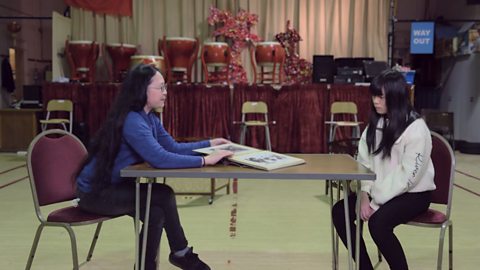
Ganesh Rai - The Gurkhas contribution to the British army. video
Eight-year-old Reva talks to Captain Ganesh Rai about the contribution of Gurkha soldiers to the British army over the past 200 years, especially during World war Two.
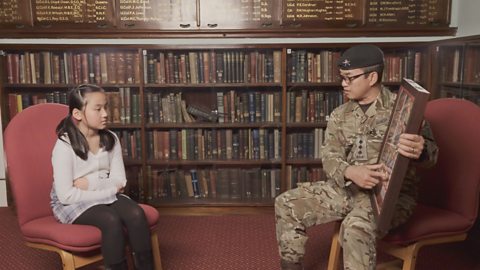
Noor Inayat Khan - Britain's first muslim war heroine. video
Author Shrabani Basu tells 14 year-old Iman about the life of Noor Inayat Khan, Britain's first muslim war heroine.
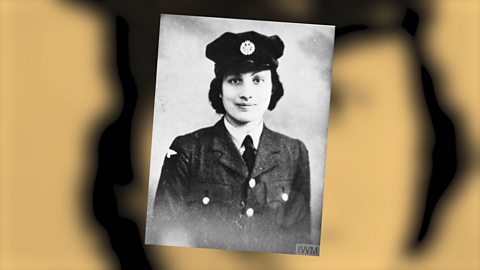
Anna Nguyen - Vietnamese migration after the Vietnam War. video
Artist Anna Nguyen talks to 11 year-old Vincent about the Vietnamese migration to Britain after the war between North and South Vietnam.
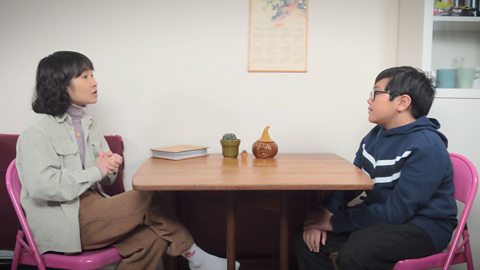
Moey Hassan - Pakistani migration to the UK. video
Actor and musician Moey Hassan talks to his nephew, 10 year-old Yusef, about the Pakistani migration to the UK.
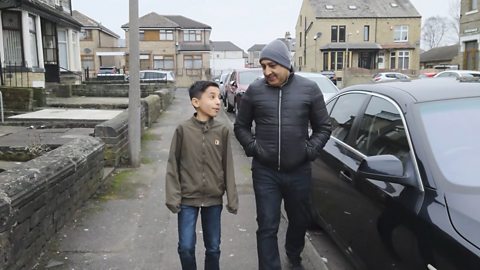
Rupal Rajani - The forced migration of Indian people from Uganda. video
Radio DJ Rupal Rajani talks to 10-year-old Ayush about how Indian people living in Uganda in the 1970's were forced to leave by the Ugandan President Idi Amin.
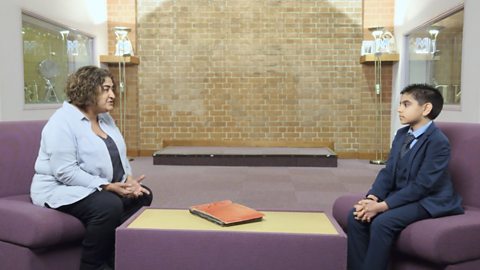
Hermann Rodrigues - South Asian migration to Scotland. video
Photographer Hermann Rodrigues talks to 15 year-old Rohit about the South Asian communities that migrated to Scotland.
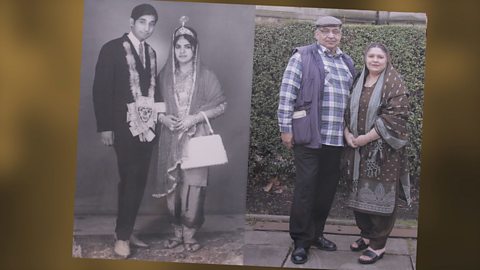
Sophia Duleep Singh - The Indian Princess who helped women gain the right to vote. video
11 year-old Hari talks to his mum about an Indian princess called Sophia Duleep Singh, who helped women in the UK gain the right to vote.
